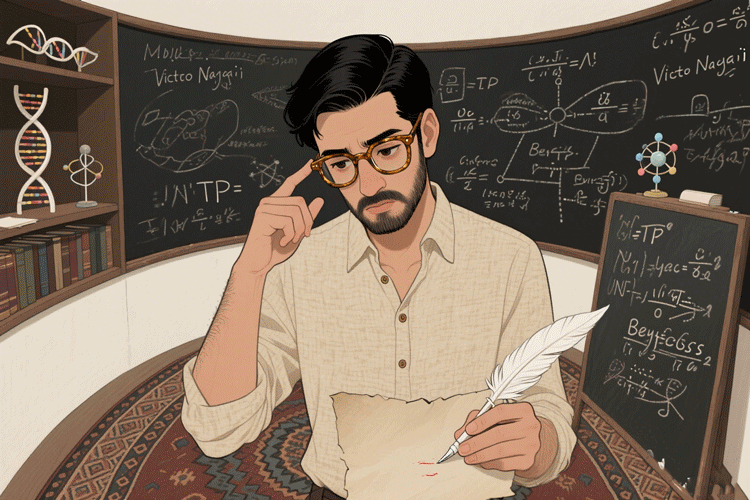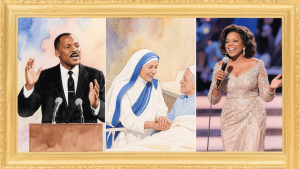INTP (Introverted, Intuitive, Thinking, Perceiving), known as “The Logician,” is one of the rarest and most intellectually curious personality types in the MBTI framework, excelling in logic, innovation, and independent thinking. Representing just 3-5% of the population, INTPs are the architects of abstract thought, constantly deconstructing and rebuilding ideas in their quest for truth and understanding.

What Is INTP? (INTP Meaning)
INTP stands for:
Introverted (prefers solitude for deep thinking) Ntuitive (focuses on abstract ideas over concrete details) Thinking (makes decisions based on logic rather than emotions) Perceiving (values flexibility and open-ended exploration)
Often called “The Logician” or “The Architect of Ideas,” INTPs are natural problem-solvers who thrive on intellectual challenges. Their cognitive function stack consists of:
Dominant: Introverted Thinking (Ti) – Internal logical framework Auxiliary: Extraverted Intuition (Ne) – Exploring possibilities Tertiary: Introverted Sensing (Si) – Recall of past experiences Inferior: Extraverted Feeling (Fe) – Social harmony
This unique combination makes them brilliant at spotting inconsistencies in systems and generating innovative solutions, though they may struggle with emotional expression and practical daily tasks.
Key INTP Personality Traits
Strengths
Highly Analytical – Masters of logic who can dissect complex theories effortlessly. INTPs enjoy taking ideas apart to understand how they work at a fundamental level. Creative & Innovative – Generate original ideas that are often ahead of their time. Their Ne function allows them to see connections others miss. Independent Thinkers – Resist conformity and prefer forging their own path. INTPs value intellectual freedom above all else. Objective & Rational – Make decisions based on facts rather than emotions. They pride themselves on being unbiased truth-seekers. Knowledge-Hungry – Possess an insatiable curiosity about how the world works. INTPs are lifelong learners who accumulate knowledge for its own sake. Honest & Direct – Value truth over social niceties. While this can be refreshing, it may sometimes come across as blunt.
Weaknesses
Socially Reserved – Struggle with small talk and emotional expression. INTPs often feel drained by prolonged social interaction. Overthinks & Procrastinates – Can get stuck in analysis paralysis, endlessly refining ideas without taking action. Perfectionist Tendencies – May abandon projects if they don’t meet impossibly high standards of logical consistency. Emotionally Distant – May overlook others’ feelings in favor of logical analysis, appearing cold or detached. Disorganized – Tend to neglect practical matters like household chores or administrative tasks. Skeptical – Their natural skepticism can make them dismiss ideas too quickly if they spot even minor flaws.
Famous INTP Celebrities
Some of the greatest minds in history are believed to be INTPs. These individuals demonstrate the INTP’s capacity for groundbreaking thought and innovation:
Historical Figures
Albert Einstein – Revolutionized physics with his theory of relativity. His thought experiments exemplify the INTP’s ability to conceptualize abstract principles. Marie Curie – Pioneering physicist and chemist who conducted groundbreaking research on radioactivity (theorized as INTP). Charles Darwin – His theory of evolution by natural selection showcases the INTP’s ability to synthesize vast amounts of information into coherent systems. René Descartes – Philosopher and mathematician whose “I think, therefore I am” epitomizes INTP introspection.
Modern Thinkers
Bill Gates – Microsoft co-founder and tech visionary whose problem-solving approach reflects INTP patterns. Larry Page – Google co-founder known for his abstract, systems-oriented thinking. Elon Musk (debatable, possibly INTJ) – While sometimes typed as INTJ, his conceptual thinking shows INTP tendencies.
Fictional Characters
Sherlock Holmes (modern interpretations) – His deductive reasoning and observational skills embody INTP cognition. Bruce Banner (The Hulk) – The genius scientist aspect of this Marvel character represents the INTP archetype. The Doctor (Doctor Who) – Particularly the Eleventh Doctor, with his childlike curiosity and brilliant problem-solving.
INTP Compatibility in Relationships

INTPs approach relationships much like they approach everything else – with careful analysis and a desire for intellectual connection. While they may not be the most emotionally expressive partners, they value deep, meaningful exchanges of ideas.
Best Matches
ENTJ – Provides structure and decisiveness, balancing INTP’s flexibility. The ENTJ’s goal-oriented nature helps ground the INTP’s abstract thinking, while the INTP helps the ENTJ consider alternative perspectives. INFJ – Offers a deep intellectual connection with emotional depth. The INFJ’s intuition complements the INTP’s, creating profound understanding. ENFJ – Helps INTPs engage socially while respecting their need for space. The ENFJ’s warmth can draw the INTP out of their shell. Other INTPs – Can form highly stimulating relationships based on mutual understanding, though may struggle with practical matters.
Challenging Pairings
ESFJ – May clash due to ESFJ’s focus on tradition and social norms vs. INTP’s abstract thinking and disregard for conventions. ISFP – INTP’s logical approach can frustrate ISFP’s emotional needs and present-focused nature. ESTJ – The ESTJ’s structured, traditional approach often conflicts with the INTP’s unconventional thinking.
Relationship Strengths
Loyal once committed Open to discussing any topic intellectually Willing to give partners space Honest and straightforward
Relationship Challenges
May forget romantic gestures or anniversaries Can become overly absorbed in their thoughts Might neglect emotional needs of partner Struggle with expressing affection verbally
Best Careers for INTPs
INTPs thrive in roles that allow creativity, autonomy, and intellectual stimulation. They perform best when they can:
Work independently Solve complex problems Engage with abstract concepts Avoid excessive routine Continue learning new things
Ideal Career Paths
| Career | Why It Fits INTP | Potential Drawbacks |
|---|---|---|
| Data Scientist | Leverages analytical skills to uncover patterns in complex data sets. Allows for creative problem-solving. | May involve too much routine data cleaning at junior levels. |
| Software Engineer | Solves complex coding problems with innovative solutions. Constantly evolving field. | Can become tedious if too much time is spent on maintenance rather than creation. |
| Research Scientist | Explores theories in physics, AI, or biology. Satisfies INTP’s curiosity. | May require dealing with funding bureaucracy. |
| Philosopher | Debates abstract concepts and systems of thought. Pure intellectual pursuit. | Limited practical applications may frustrate some INTPs. |
| Entrepreneur | Builds disruptive startups with original ideas. Freedom to innovate. | Requires skills INTPs may lack (networking, sales). |
| University Professor | Researches specialized topics while teaching. Academic freedom. | May dislike administrative duties and grading. |
| Architect | Designs innovative structures combining art and engineering. | Client demands may limit creativity. |
| Forensic Scientist | Solves puzzles using scientific methods. Appeals to INTP’s analytical nature. | May involve more routine than expected. |
Worst Career Fits
Customer Service (too repetitive and emotionally draining) Military/Police (too rigid and hierarchical) Sales (requires too much social interaction and emotional labor) Accounting (too detail-oriented and routine) Nursing (too emotionally demanding and structured)
INTP vs INTJ: Key Differences
While both are analytical, strategic thinkers, INTPs and INTJs have fundamentally different approaches to problem-solving and life in general.
Cognitive Functions Comparison
| Function | INTP | INTJ |
|---|---|---|
| Dominant | Introverted Thinking (Ti) | Introverted Intuition (Ni) |
| Auxiliary | Extraverted Intuition (Ne) | Extraverted Thinking (Te) |
| Tertiary | Introverted Sensing (Si) | Introverted Feeling (Fi) |
| Inferior | Extraverted Feeling (Fe) | Extraverted Sensing (Se) |
Behavioral Differences
| Trait | INTP | INTJ |
|---|---|---|
| Decision-Making | Explores all possibilities before acting, may struggle to conclude | Decisive, prefers structured plans once decision is made |
| Focus | Theoretical concepts for their own sake | Practical execution and real-world impact |
| Social Style | More laid-back and flexible, may appear scattered | More strategic and commanding, appears organized |
| Work Approach | Follows curiosity wherever it leads | Works toward specific long-term goals |
| Famous Example | Albert Einstein | Elon Musk (theorized as INTJ) |
| Stress Response | Withdraws into analysis | Becomes more controlling |
| Innovation Style | Creates new frameworks | Improves existing systems |
INTJs are “Masterminds,” while INTPs are “Logicians” – both brilliant but with different approaches to problem-solving. INTJs seek efficiency and execution, while INTPs seek understanding and theoretical consistency.

INTP vs INFP: How They Differ
Though their four-letter codes differ by only one letter, INTPs and INFPs are fundamentally different in their worldview and decision-making processes.
Cognitive Functions Comparison
| Function | INTP | INFP |
|---|---|---|
| Dominant | Introverted Thinking (Ti) | Introverted Feeling (Fi) |
| Auxiliary | Extraverted Intuition (Ne) | Extraverted Intuition (Ne) |
| Tertiary | Introverted Sensing (Si) | Introverted Sensing (Si) |
| Inferior | Extraverted Feeling (Fe) | Extraverted Thinking (Te) |
Key Distinctions
| Trait | INTP | INFP |
|---|---|---|
| Core Motivation | Seeks truth and logical consistency | Driven by personal values and authenticity |
| Decision-Making | Objective analysis of facts | Alignment with personal ethics and feelings |
| Communication Style | Direct, fact-based, may seem blunt | Emotionally expressive, poetic, diplomatic |
| Work Approach | Focused on systems and ideas | Focused on meaning and human impact |
| Conflict Resolution | Wants to logically analyze the problem | Wants to address emotional undercurrents |
| Creative Output | Innovative systems and theories | Artistic expressions of human experience |
| Stress Response | Overanalyzes the situation | Withdraws emotionally, may become self-critical |
| Famous Examples | Albert Einstein, Bill Gates | J.R.R. Tolkien, William Shakespeare |
While both are introspective and intuitive, INTPs prioritize logic and systems, whereas INFPs prioritize values and human experience. Both types share creativity but express it differently – INTPs through intellectual innovation, INFPs through artistic expression.
The INTP Mind: A Deeper Dive
Intellectual Development
INTPs typically show early signs of their personality type through:
Early interest in how things work (taking apart toys, asking “why” constantly) Preference for theoretical over practical learning Resistance to authority that can’t justify its rules logically Natural skepticism toward accepted wisdom
As they mature, healthy INTPs learn to:
Balance their Ti with development of their inferior Fe Apply their insights to real-world problems Communicate their ideas effectively to others Manage their natural procrastination tendencies
Growth Opportunities
For INTPs seeking personal development:
Emotional Intelligence – Practice recognizing and expressing emotions Action Orientation – Set deadlines to overcome analysis paralysis Social Skills – Develop small talk as a tool for networking Practical Life Skills – Create systems for managing daily responsibilities
Potential Pitfalls
Unhealthy INTPs may:
Become overly cynical and dismissive of others’ ideas Isolate themselves intellectually and socially Neglect their physical health and environment Engage in endless theorizing without application
Conclusion
INTPs are the visionary thinkers of the MBTI world—innovative, independent, and relentlessly curious. Their unique combination of introverted thinking and extraverted intuition allows them to see patterns and possibilities invisible to others. While they may struggle with social norms and emotional expression, their ability to solve complex problems is unparalleled.
Throughout history, INTPs have reshaped our understanding of the world through their groundbreaking theories and inventions. From scientific revolutions to technological innovations, the INTP’s fingerprints are all over human progress. In personal relationships, they may not be the most emotionally demonstrative partners, but they offer intellectual depth, honesty, and loyalty.
For INTPs seeking fulfillment, the key lies in finding environments that nurture their curiosity while gently pushing them to develop their weaker functions. When balanced, the INTP’s brilliant mind can change the world while maintaining meaningful human connections.
Did you find this guide helpful? Share your thoughts in the comments!
“The INTP is not just a thinker—they are an architect of ideas, building frameworks for understanding the universe. Their greatest gift is not just in seeing the world differently, but in helping others see it anew.”
The most prominent characteristics of INTP are: 1. Logic supremacy: basing decisions on objective analysis; 2. Conceptual drive - obsessed with theories and abstract patterns; 3. Insatiable thirst for knowledge - learning for the sake of learning; 4. Innovative thinking - 90% of their time is spent constructing systems in their minds. They are known as 'logicians', accounting for 3% of the population, and typical examples include Albert Einstein, who can transform complex theories into breakthrough insights.
Advantages: 1. Talent for solving complex problems; 2. Excellent ability to work independently; 3. Breakthrough innovative thinking (such as Linus Torvalds, the founder of Linux). Disadvantages: 1. Difficulty in executing details; 2. Dislike of bureaucratic processes; 3. Tend to feel awkward in social situations. Most suitable for fields requiring deep thinking, such as theoretical physics, programming, and philosophical research, and to avoid social-intensive jobs such as sales and customer service.
The sense of alienation stems from: 1. Emotional analysis tendency - habitually rationalizing emotions; 2. High social energy consumption - small conversations feel like torture; 3. Expression barriers - brain speed far exceeds verbal output. Improvement strategies: Establish a complementary relationship with ENFJ/ENTJ types, adopt the 'emotional translation method' (for example, replace 'I understand' with 'I logically agree with your feelings'), and regularly arrange time for solitude and recharging.
Ways to boost motivation: 1. Set clear deadlines; 2. Break down large tasks into small steps; 3. Find a supervising partner; 4. Allow yourself to start with 'good enough' instead of striving for perfection; 5. Establish a simple workflow. The key is to balance the time allocation between thinking and practice.





